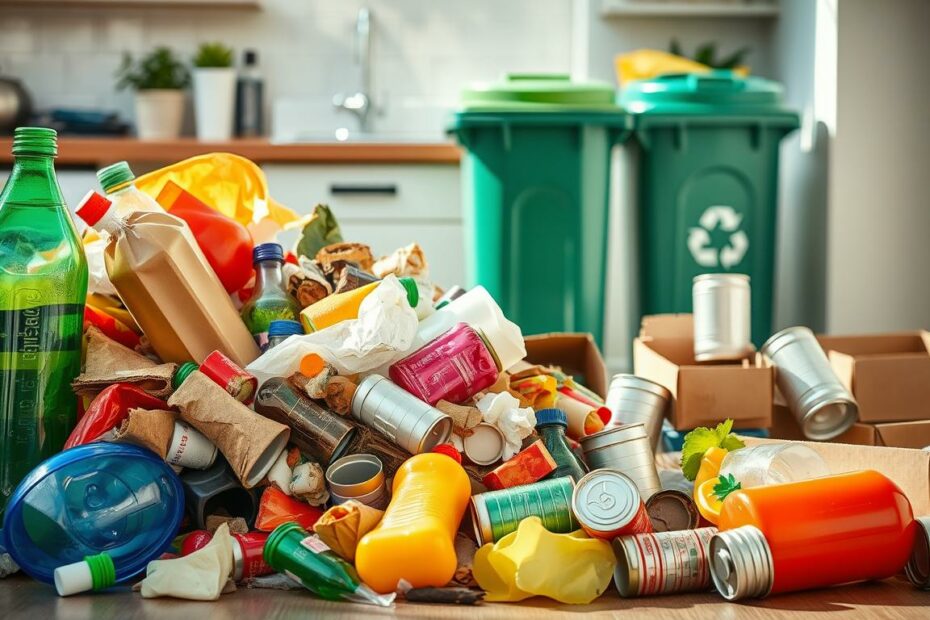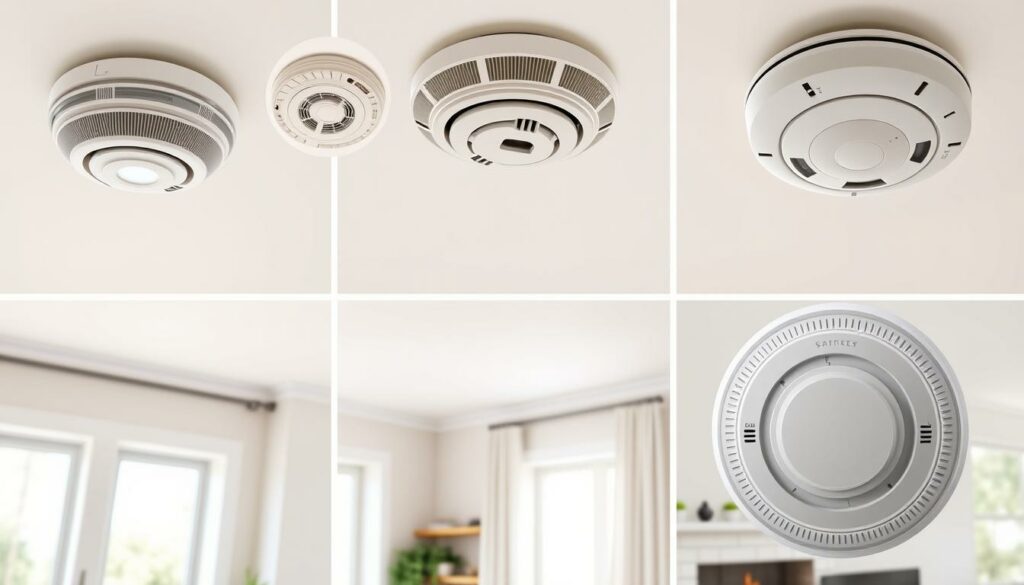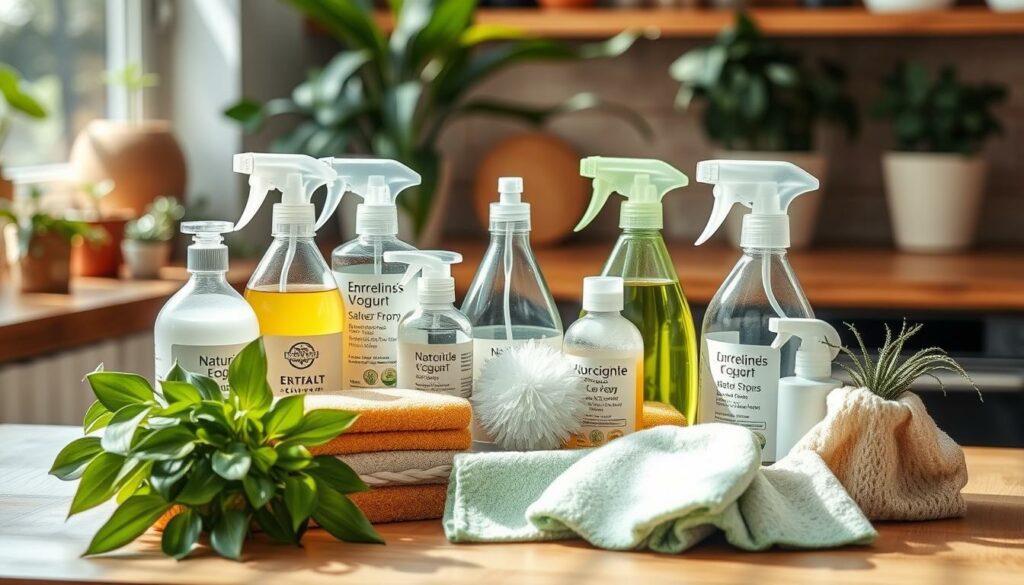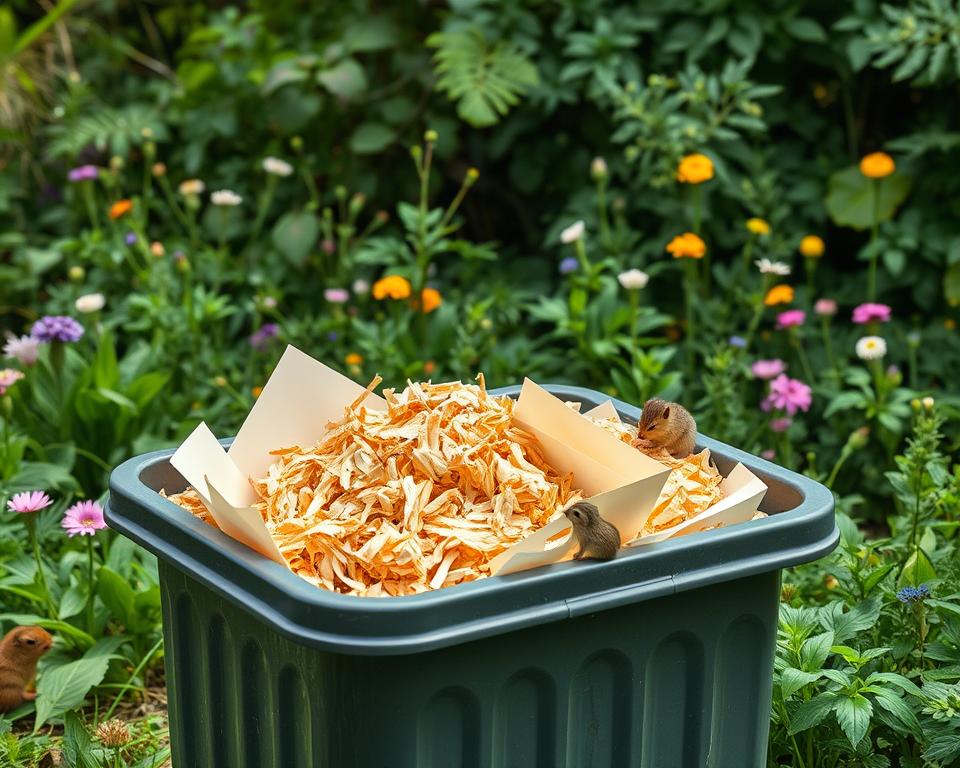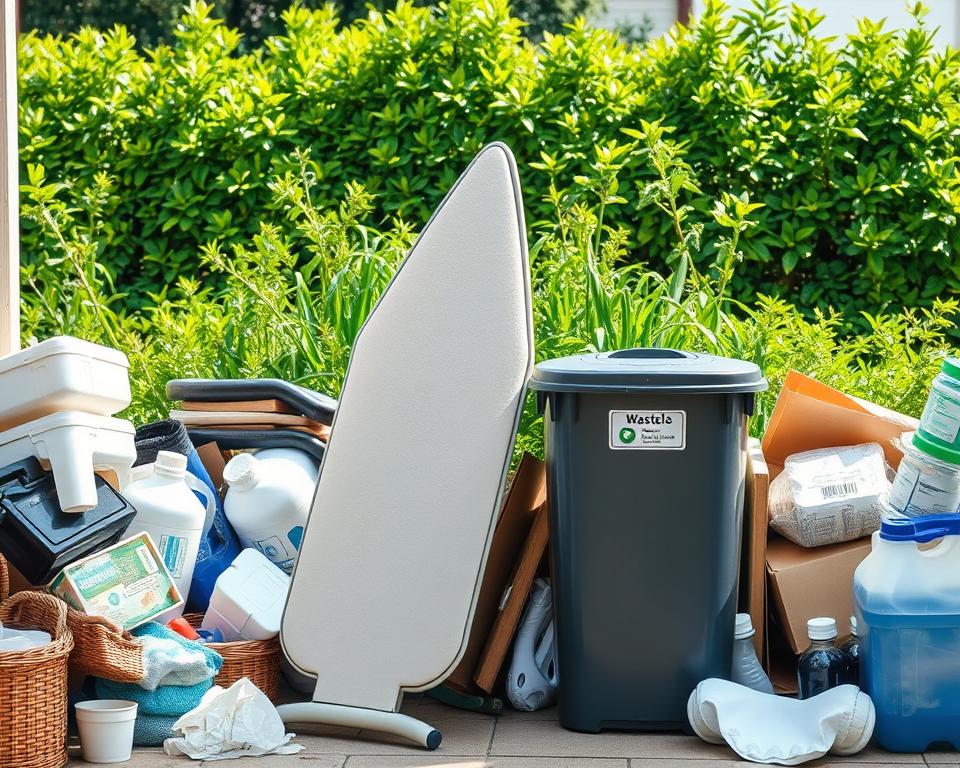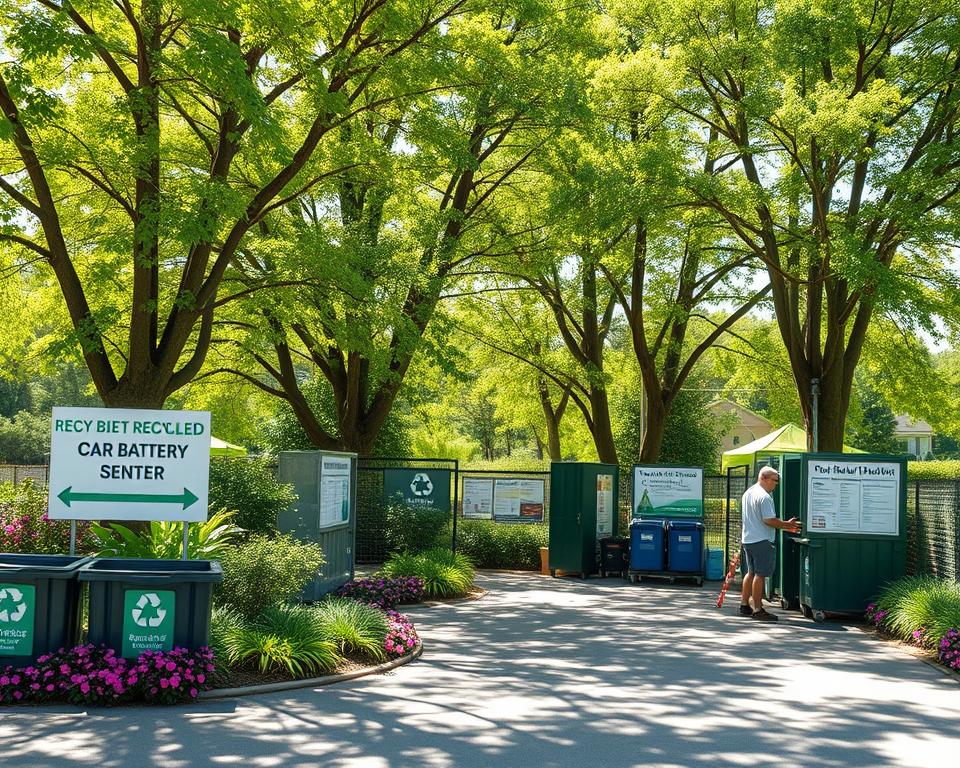In New York State, over 100,000 tons of hazardous household waste are thrown away each year. This waste often ends up in landfills or incinerators, harming the environment. It’s important to dispose of household waste properly to keep our environment clean and sustainable. This article offers simple tips and strategies to manage your waste, reduce your impact on the environment, and keep your home tidy.
This guide helps you deal with hazardous materials, cooking oil, and batteries responsibly. By following these easy steps, you can help make our planet healthier. You’ll also make your living space cleaner and more sustainable for everyone.
Key Takeaways
- Proper disposal of household waste is essential for maintaining a clean and sustainable environment.
- This article provides easy tips and strategies to effectively manage your household waste.
- The guide covers a wide range of waste disposal methods, from hazardous materials to batteries and cooking oil.
- Adopting eco-friendly waste disposal practices can contribute to a healthier planet and a cleaner living space.
- Triclosan, an ingredient found in many antibacterial cleaning products, was banned from household soap products in the U.S. in 2016.
Tackling Hazardous Household Waste
Managing hazardous household waste is key for the environment and our safety. Items like acids, bases, and asbestos need special care. This ensures they are disposed of safely and responsibly.
Acids and Bases
Household products with acids or bases, like some cleaners and pool chemicals, can be dangerous. To dispose of them safely, mix the substance with lots of water. Then, pour it down the drain while running more water.
Make sure you have good air flow and wear gloves and goggles. This will help keep you safe.
Asbestos-Containing Materials
Asbestos is a mineral found in old buildings. It can be harmful if disturbed. If your home has asbestos, like in floor tiles or insulation, get a pro to check and remove it.
This way, you can avoid health risks. Following local rules and using special waste programs is important. It keeps our environment and families safe.
Proper Disposal of Household Appliances
Getting rid of big items like refrigerators and air conditioners is tough. This is because they have refrigerants like freon (chlorofluorocarbons or CFCs). A certified technician must remove these before the appliance can be safely thrown away or recycled. To find out how to dispose of big items, homeowners can contact their local government about “large item pickup” services.
For air conditioners, freon must be removed by a pro. You can rent a dumpster, use curbside pickup, or hire a junk removal service. Broken dishwashers can also be disposed of in these ways.
There are many ways to get rid of an old stove or oven. You need to think about if it’s gas or electric and follow EPA rules. Places like Goodwill, The Salvation Army, and Habitat for Humanity might take used appliances. You can also sell them on eBay, OfferUp, Craigslist, or Facebook Marketplace.
| Appliance Disposal Options | Average Cost |
|---|---|
| Junk Removal Service (less than 9 cubic yards) | $297 |
| 20-yard Dumpster Rental | $447 + $30 disposal fee |
| Quarter Bedload Junk Removal | $275 |
| Full Bedload Junk Removal | $600 |
Looking into local recycling programs, utility providers, appliance stores, and city/county websites can help. They can show you the best and cheapest ways to get rid of your appliances in an eco-friendly way.
Dispose Household Waste: Batteries
It’s important to dispose of household batteries the right way. This helps keep our environment clean and recovers valuable materials. Different types of batteries need different disposal methods.
Alkaline Batteries
Alkaline batteries made in the US don’t have mercury anymore. So, they can go in the regular trash. But, in places like California, throwing away any battery is illegal. You can order recycling kits online to recycle them safely.
Rechargeable Batteries
Rechargeable batteries, like those in phones and tools, should be recycled. Stores like The Home Depot offer free recycling through programs like Call2Recycle. These batteries can be used many times, saving resources and reducing waste.
Automotive Batteries
Car batteries have lead and acid and can’t go in the trash. They need to be recycled at special centers. Many auto stores and places that handle hazardous waste will take them for recycling.
| Battery Type | Disposal Method |
|---|---|
| Alkaline | Household trash (in most areas), recycling kits available |
| Rechargeable | Recycling programs through retailers and household hazardous waste facilities |
| Automotive | Recycling through authorized centers or household hazardous waste facilities |
Proper disposal of household batteries helps our environment and saves resources. Always check local rules and look for recycling options near you.
Responsibly Handling Cooking Oil Waste
Getting rid of used cooking oil can be tricky since landfills don’t take liquids. But, there are good ways to handle it. If you can’t find a local program for cooking oil, mix it with something like cat litter first. Then, throw it away in the trash.
Every month, a typical household uses about 1 gallon of cooking oil. Sadly, only 30% of people dispose of it correctly. Meanwhile, 70% of plumbing problems come from pouring oil down drains.
Some people freeze or refrigerate their oil before throwing it away. This keeps it safe. Others mix it with cat litter before tossing it. Cooking oil can last 30 days in the fridge. You can reuse it solidly up to three times, but only if it smells good and doesn’t have black bits.
Cooking oil and grease are harmful if not thrown away right. But, they can be turned into biofuels, soaps, and more. This makes them eco-friendly. Some people reuse oil to save money, but it’s important to think about health and food quality too.
To handle cooking oil waste safely, filter and store it well. Use tight containers and label them with the first use date. Also, check the oil’s expiry date and smoke point. This keeps it fresh and safe for cooking.
| Statistic | Value |
|---|---|
| Average household cooking oil waste per month | 1 gallon (3.79 liters) |
| Plumbing issues caused by pouring cooking oil down the drain | 70% |
| Households that properly dispose of used cooking oil | 30% |
| Households that freeze or refrigerate used cooking oil before disposal | 20% |
| Households that mix used cooking oil with absorbent materials before disposal | 15% |
| Shelf life of properly stored, refrigerated cooking oil | 30 days |
| Reuse potential of cooking oil | 2 solid recycle uses (3 total uses) |
Safe Disposal of Fireworks
Fireworks might seem fun, but they’re actually hazardous waste. It’s crucial to dispose of them safely to protect our community and the environment. Here’s how to do it right:
- Soak the fireworks in water until they’re fully saturated. This can take up to 15 minutes for small items or overnight for larger ones.
- Wrap the soaked fireworks in double trash bags to keep them wet.
- Keep the wrapped fireworks away from kids and pets until trash day or landfill drop-off.
Most places that handle hazardous waste don’t take fireworks. Contact your local police to see if they have a disposal program. If not, you can put the wet fireworks in your regular trash for disposal at the landfill.
For a better option, consider renting a roll-off dumpster. It can handle all your unwanted items, including fireworks. This way, you ensure everything is disposed of safely and responsibly.
Never burn or throw away fireworks without proper care. By following these steps, you help keep our community and environment safe.
For more info on recycling and waste disposal, visit www.ohswa.org or call (315) 733-1224. You can also use the www.AmIRecyclable.com tool to find the right way to dispose of thousands of items.
Dealing with Smoke Detectors
Smoke detectors are key to keeping homes safe. But, getting rid of them can be tricky. There are two main types: photoelectric and ionizing. Ionizing detectors have a radioactive part, so they need special care when thrown away.
Ionizing Smoke Detectors
Don’t just throw ionizing smoke detectors in the trash. They have a small amount of radioactive material. This is about 3,000 times less than what we normally get from background radiation. Still, it’s important to dispose of them correctly.
Consider using photoelectric smoke detectors instead. They don’t have the same disposal problem. If you have an ionizing detector, call your local waste management or authorities. They can tell you how to get rid of it right.
| Smoke Detector Type | Radioactive Material | Disposal Considerations |
|---|---|---|
| Photoelectric | None | Can be disposed of in regular trash |
| Ionizing | Americium-241 | Should not be placed in regular trash; contact local authorities for proper disposal instructions |
Smoke or carbon monoxide detectors usually last seven to ten years. If yours are older, it’s time to replace them. This keeps them working well and avoids disposal problems.
Mercury in Household Thermostats
Older household thermostats might have mercury, a harmful substance. It needs special care when thrown away. If not disposed of right, it can harm the environment and people’s health.
Many homes have products with mercury. These products can’t be thrown away like regular trash. They need special care to keep our environment safe.
Some states have banned mercury thermostats. This change happened in 2004 in Connecticut. By 2012, they made laws to help recycle these thermostats.
The Thermostat Recycling Corporation (TRC) was started in 1998. It helps recycle mercury thermostats. Businesses and schools can recycle them for free through the TRC program.
Recycling mercury thermostats is key. It keeps mercury out of our environment. If you have an old thermostat, find a safe way to get rid of it.
If mercury spills, call your local health department right away. Mercury can harm our brains, kidneys, and lungs. It’s also bad for a growing baby.
| Key Statistics | Value |
|---|---|
| % of households with products containing liquid mercury | Not uncommon |
| % of mercury-containing products that must be saved for household hazardous waste collection | 100% |
| % of households advised to replace mercury-containing products | Encourages replacement |
| % of households with elemental mercury left over | Many households |
| % of households advised on how to package mercury for storage and transportation | Guidelines provided |
| % of households advised to contact the Illinois Department of Public Health in case of a mercury spill | Immediate contact recommended |
Eco-Friendly Cleaning Product Disposal
We all want a cleaner, greener home. Properly getting rid of cleaning products is key. Improper disposal can harm the environment and our health. Luckily, there are easy ways to dispose of these products safely.
Start by using or giving away any leftover cleaning products. Try to finish what you have before throwing it away. If you have unused items, donate them to local charities or groups.
For products you can’t use or give away, follow the disposal instructions. Water-soluble cleaners can go down the drain with water. Solid cleaners and wipes should go in the trash.
Be careful with hazardous products like oven cleaners or floor strippers. They might need special disposal. Check with your local government for the best way to get rid of them.
Buying eco-friendly products can also help. Look for ones in recyclable or reusable packaging. Many brands now offer concentrated formulas and products made from recycled materials.
By following these steps, we can protect our homes, communities, and the planet. Every small action towards better waste management helps a lot.
Conclusion
Proper disposal of household waste is key to a clean and sustainable home. This article offers tips to manage waste, reduce environmental impact, and keep your home tidy. It covers everything from hazardous materials to cooking oil and batteries.
Small actions can lead to big changes in our living spaces. By using new waste management tech and working together, we can make a difference. This way, we can ensure waste is handled responsibly and sustainably.
By applying the ideas from this article, you help your community and the environment. Let’s strive for a cleaner, greener world, starting with our own homes.
FAQ
How can I safely dispose of household hazardous waste like acids, bases, and asbestos?
Household hazardous waste needs special care. For acids and bases, dilute them first. Asbestos must be removed and disposed of correctly, following local rules and wearing protective gear.
What is the proper way to dispose of household appliances like refrigerators and air conditioners?
First, have a certified technician remove the refrigerant from appliances. Then, check with local authorities for “large item pickup” services. This helps with disposing of big items.
How should I dispose of different types of household batteries?
Alkaline batteries can go in the trash. But, rechargeable and automotive lead-acid batteries need recycling. Always cover terminals and use plastic bags to avoid short circuits.
What is the best way to get rid of used cooking oil?
If you can’t find a collection program, mix the oil with cat litter to solidify it. Then, throw it away. For large amounts, contact local rendering plants or recyclers.
How do I properly dispose of fireworks?
Fireworks are hazardous waste. Soak them in water, then wrap in double trash bags. Store safely before throwing away on pickup day or landfill drop-off.
What should I do with ionizing smoke detectors that contain radioactive material?
Don’t throw away ionizing smoke detectors in regular trash. They have radioactive parts. Use photoelectric smoke detectors instead or contact local authorities for disposal guidance.
How do I properly dispose of mercury-containing household thermostats?
For mercury-containing thermostats, contact HVAC contractors or distributors. They should participate in a national recycling program for safe disposal.
What is the best way to dispose of household cleaning products?
Use up or give away unused cleaning products. Follow the disposal instructions from the manufacturer. Water-soluble cleaners can go down the drain. Solid cleaners and wipes can be thrown away. Always recycle containers and choose products with less packaging.
